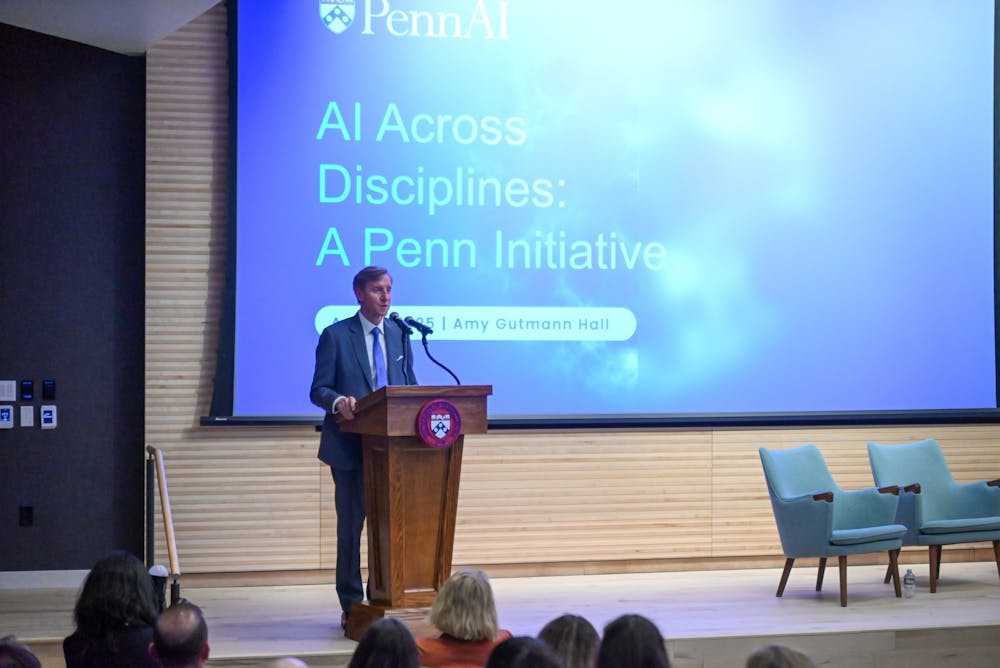
Penn President Larry Jameson announces the new PennAI initiative at Amy Gutmann Hall on April 1.
Credit: Connie ZhaoSenior Penn administrators and faculty members officially launched the Penn AI initiative at an event that took place at Amy Gutmann Hall on April 1.
The Penn AI launch event offered insight into the growing use of AI in research as well as the need for Penn to keep up with technological advancements. The event featured speeches from Penn President Larry Jameson, Provost John Jackson Jr., Operations, Information and Decisions professor Lynn Wu, and members of the Penn AI Council.
The council is composed of Physics and Astronomy professor Bhuvnesh Jain, Genetics professor Marylyn Ritchie, Penn Integrates Knowledge University Professor René Vidal, and PIK University Professor Duncan Watts.
Jackson and Jameson began the event by reminding attendees that the potential of AI should be approached with ambition and caution.
“Rarely, if ever, has a new technology arrived with such promise but also such potential peril,” Jackson said. “Not to mention countless philosophical questions related to its very deployment.”
Penn AI is split into four categories: business, health, science, and society. The panelists were asked about the potential of AI to revolutionize their respective fields.
Ritchie highlighted one of her colleagues' projects that uses AI to record doctor-patient interactions, allowing the physicians to give their undivided attention to their patients instead of note-taking simultaneously.
“What's happening in different clinical conditions is that maybe the AI can pick up on the things that a human might miss,” Ritchie said. “But with AI, we could make those healthcare visits much more enjoyable for the providers.”
When asked the same question, Wu addressed the impact of AI in the field of business, specifically debunking the concern of AI negatively impacting the job market.
She highlighted that, according to her research, the job market expands because of increased productivity when firms use new technologies such as robots or AI.
“That means we need to educate our students to be more competitive,” Wu said. “From a management standpoint, we need to train the next generation of managers to work in a way that’s compatible with new technologies.”
The unique position Penn stands in to continue driving innovation in the field of AI arose as a common theme throughout the event. Jameson and Jain both took pride in all 12 of Penn’s schools being represented among the panel and its audience.
Jain went on to highlight the interdisciplinary applications of AI.
“A student who's looking at brain scans and signs of cancerous cells and another student looking at images of galaxies are using almost the same deep learning model to interpret the data,” Jain said. “The questions they’re after are different, but they're picking up the same tools and can learn from each other.”
The later part of the panel stressed Penn’s aim to prepare students for the real world by ensuring they are equipped with the necessary skills to enter a workforce driven by AI and other emerging technologies.
“Penn already has a long history of investing in what Franklin would call the 'decorative arts,'” Watts said. “Penn has a history of wanting to take problems from the real world seriously, rather than just the problems that we talk about inside our academic disciplines.”
The panelists concluded their remarks by expressing where they see AI going within the next five to 10 years.
“We have to figure out, as a council, how we teach AI to our entire workforce and in all 12 schools,” Ritchie said. “AI is going to be really important, and we need to figure out how to put AI in the hands of everyone.”
April also marks the beginning of the School of Engineering and Applied Science's 2025 AI Month, themed "AI and Human Well-Being." The month aims to bring together the Penn community with experts in the field of AI to examine the potential of AI as well as ethical dilemmas the technology may present.
“The impact of AI is widespread and goes beyond engineering," Engineering School Dean Vijay Kumar told Penn Today. "As innovators, we are not only building the future of AI but also ensuring that it serves humanity responsibly."
The Daily Pennsylvanian is an independent, student-run newspaper. Please consider making a donation to support the coverage that shapes the University. Your generosity ensures a future of strong journalism at Penn.
Donate










